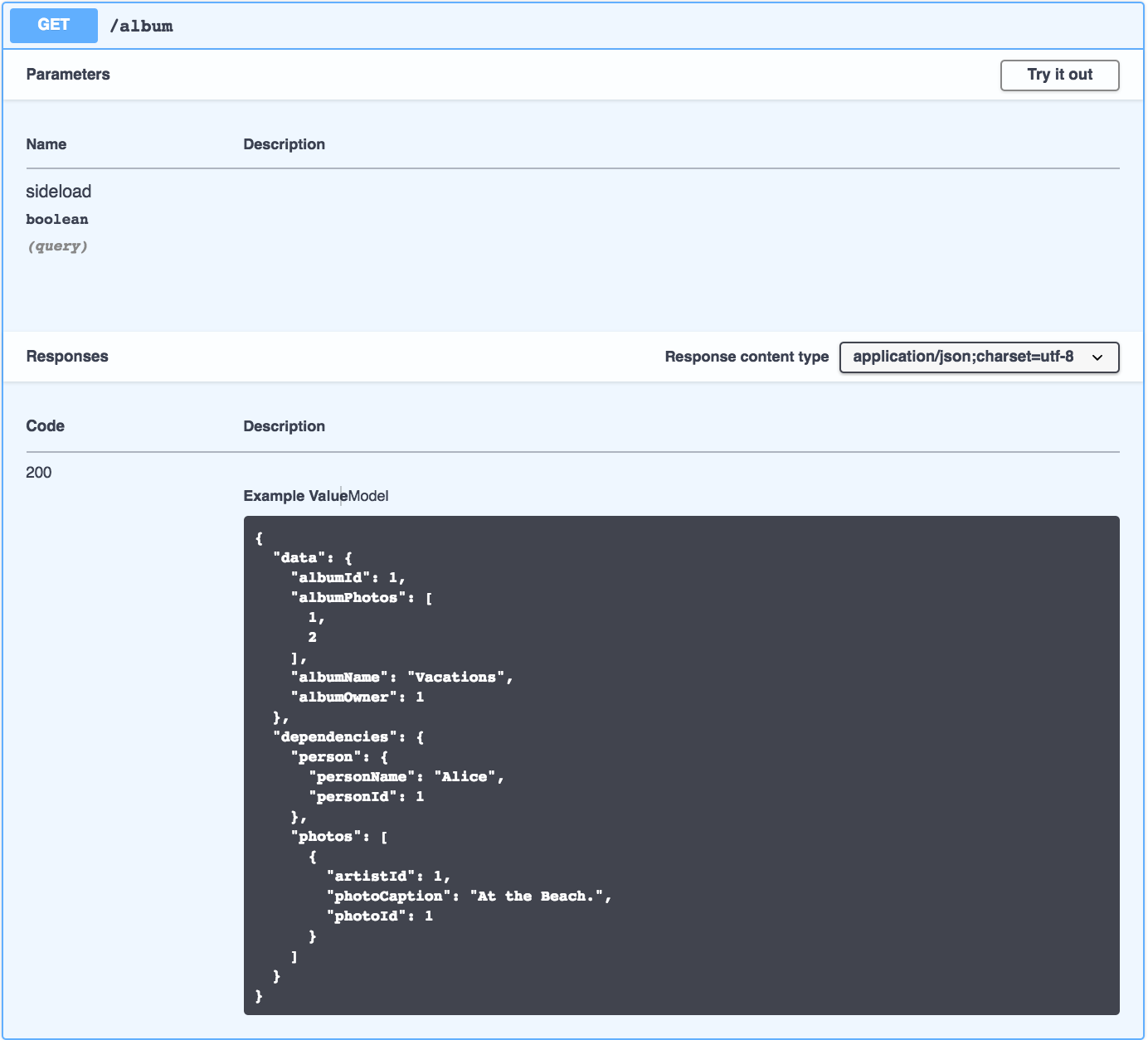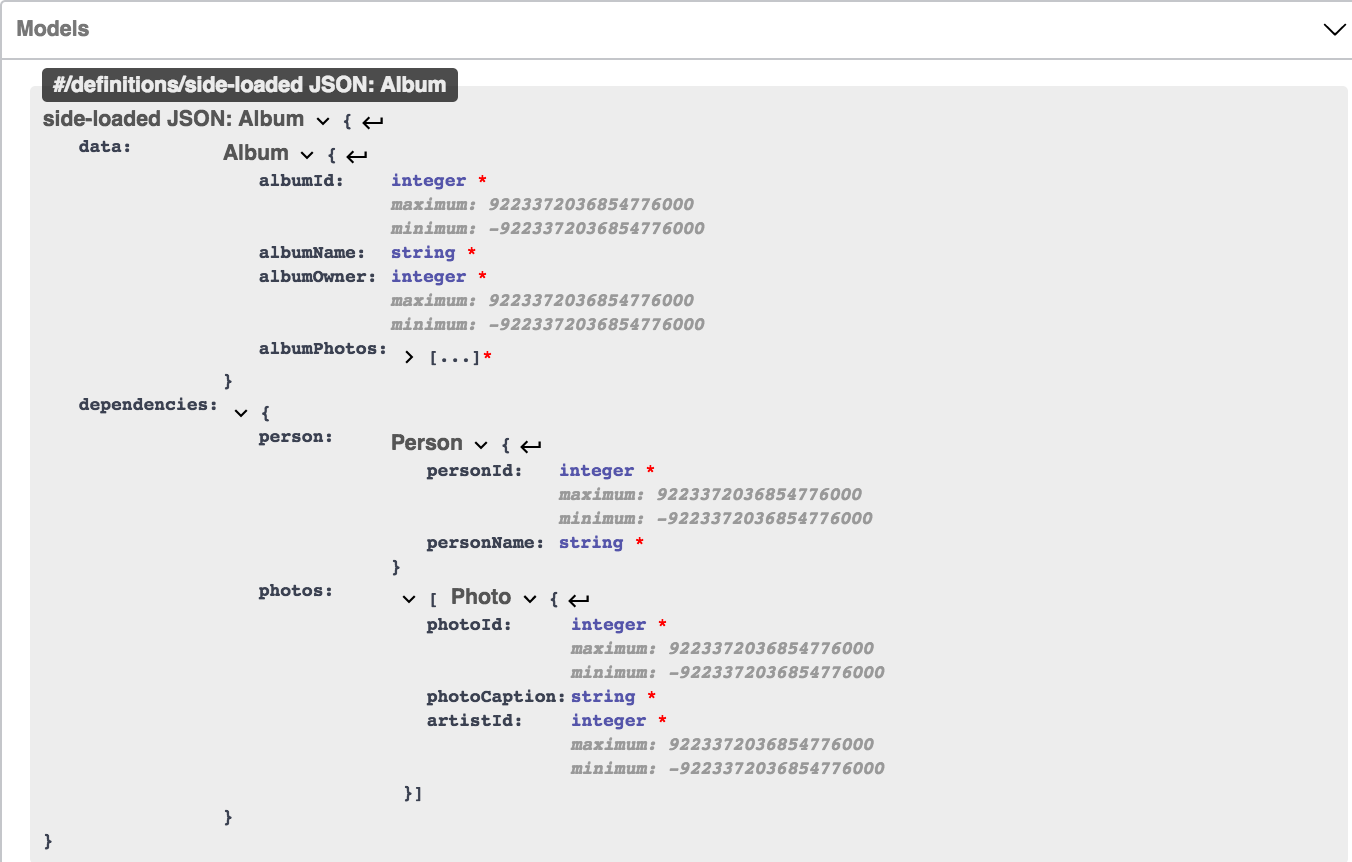servant-zeppelin alternatives and similar packages
Based on the "servant" category.
Alternatively, view servant-zeppelin alternatives based on common mentions on social networks and blogs.
-
servant
Servant is a Haskell DSL for describing, serving, querying, mocking, documenting web applications and more! -
servant-generate
Generate default implementations for servers in a flexible way (a.k.a servant-mock on steroids)
Sevalla - Deploy and host your apps and databases, now with $50 credit!

Do you think we are missing an alternative of servant-zeppelin or a related project?
README
servant-zeppelin 
Server Side Loading JSON
Overview
The point of servant-zeppelin is to enable server side loading of JSON data without having to write boilerplate.
Take the following Album datatype for example, which is expanded in greater detail in the tests:
data Album =
Album { albumId :: AlbumId
, albumName :: String
, albumOwner :: PersonId
, albumPhotos :: [PhotoId]
}
It's often the case that we have such a datatype which carries foreign keys to other data, for example PersonId and PhotoId. The client application would probably not be able to do anything useful with the JSON response for Album without making additional requests to the server to fetch more data about the album owner or photos. At the same time, it might not be worth the effort for the server to implement a new data type representing the join of Album and Person, or even worse all O(2n) possible combinations of dependencies. We introduce a new servant combinator to capture what we call Inflatable data, meaning that there is a way to expand the data in some context. For example, if the above Album is represented by a row in a postgres table, we probably already have functions laying around like
getPersonById :: PersonId -> PGMonad Person
getPersonById = ...
getPhotosByIds :: [PhotoId] -> PGMonad [Photo]
getPhotosByIds = ...
We can use these functions to implement our Inflatable typeclass, e.g.
instance Inflatable PGMonad PersonId where
type Full PGMonad PersonId = Person
inflator = getPersonById
and similarly for [PhotoId]. We can then indicate that Album has dependencies on these datatypes like this:
instance HasDependencies Album '[PersonId, [PhotoId]] where
getDependencies album = albumOwner album &: albumPhotos album &: NilDeps
This gives us access to a new servant combinator SideLoad (deps :: [*]) which can be used at the end of a typed route in the following way:
...
:<|> Capture "album" AlbumId :> Get '[PlainText, JSON] Album :> SideLoad '[Person, [Photo]]
...
The semantics are similar to QueryFlag-- the presence of the keyword sideload in the query params, or the key value pair sideload=true or sideload=1, will trigger a response with the additional sideloaded data if the desired content type is application/json. The absence of this flag returns the normal JSON serialization. If the desired content type was PlainText in this example, nothing out of the ordinary happens.
Here is an example of the different responses:
{
"albumId": 1,
"albumPhotos": [
1,
2
],
"albumName": "Vacations",
"albumOwner": 1
}
{
"data": {
"albumId": 1,
"albumPhotos": [
1,
2
],
"albumName": "Vacations",
"albumOwner": 1
},
"dependencies": {
"person": {
"personName": "Alice",
"personId": 1
},
"photos": [
{
"artistId": 1,
"photoCaption": "At the Beach.",
"photoId": 1
},
{
"artistId": 1,
"photoCaption": "At the Mountain.",
"photoId": 2
}
]
}
}
servant-zeppelin-server
Much of what was needed to understand the server component was explained above. In order to get the ToJSON instances for your sideloaded data, it's sufficient to have ToJSON instance for all the components and that the components of the dependencies are instances of a type family called NamedDependency. More concretely, in the above example we would need
instance ToJSON Person
type instance NamedDependency = "person"
instance ToJSON [Photo]
type instance NamedDependency = "photos"
instance ToJSON Album
in order to derive the instance ToJSON (SideLoaded Album '[Person, [Photo]]), which is sufficient to support the route.
The second component which was needed is a way to transfer the context of the inflation to servant's Handler monad. Concretely, if our PGMonad above was newtyped around something like ReaderT Connection (ExceptT QueryError IO), we need to provide a natural transformation of type PGMonad :~> Handler to the Context when we define our application. In principle it might happen that you use different contexts for different datatypes, for example if you were maintaining two seprate databases. This is ok as long as you provide both transformations to the Context. You can see the tests for more details.
servant-zeppelin-swagger
In order to have the swagger docs generate for an endpoing using the ... a :> SideLoad deps combinator, we need to have a ToSchema instance for SideLoaded a deps. The will be automatically derived for you with sensible choices proveded that you have a ToSchema instance for both a and every d in deps. With swagger, a picture is worth more than code, but you can see the tests for how to generate this:


servant-zeppelin-client
We also provide a HasClient instance for the SideLoad deps combinator, though it behaves a little bit differenty than most HasClient instances you might have encountered so far. The problem is that a real HasClient instance is dependently typed-- if you give me sideload=true param, I exepect the sideloaded data of type SideLoaded a deps, and if it's not there I expect something of type a. In order to get around the type systems limitations, the HasClient instance provides us with a dependently typed function which takes a singleton boolean to get the desired type.
Also, the client has a bias for using requesting JSON-- this seems fair to me because there is yet no reason to use a SideLoad combinator on a route without JSON as a valid mime type. The necessary FromJSON instances are supplied in the client lib as well, and as usual they can be automatically derived so long as the components all have instances.
The client library also exposes a typeclass ProjectDependency implementing a single method projectDependency. This has the same semantics as servant's HasContext typeclass, and can be useful to get data out of a side loaded response.
Again, see the tests for examples.

